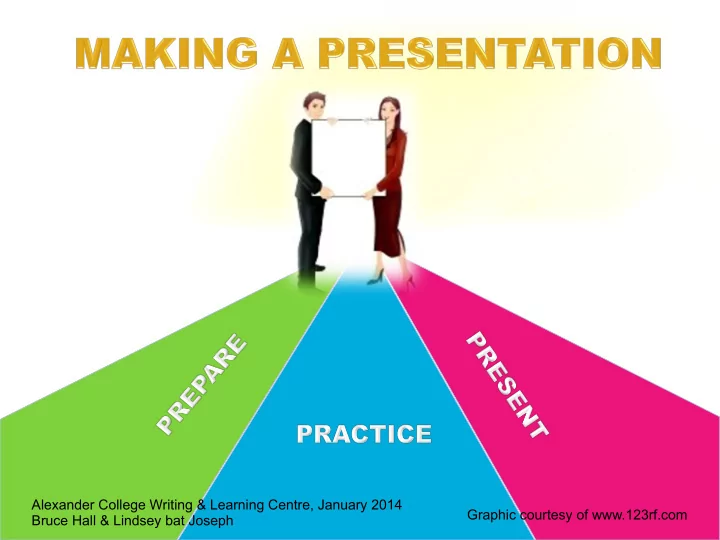

Alexander College Writing & Learning Centre, January 2014 Graphic courtesy of www.123rf.com Bruce Hall & Lindsey bat Joseph
• A presentation is much like an essay • You introduce your topic, • give supporting details and • come to a conclusion.
• Think about your audience, – What do they probably know about your topic? – What will interest them?
• Get all the information, data, details you need
• Visuals should support YOU, not replace you. • They should be clear and simple. Study A+ Success!
• According to the theory, as the Universe cooled after the big bang it eventually became possible for common subatomic particles as we know them (neutrons, protons and electrons) to exist. The most common particles created in the big bang which are still easily observable to us today were protons and electrons (in equal numbers). The protons would eventually form hydrogen atoms. Almost all the neutrons created in the Big Bang were absorbed into helium-4 in the first three minutes after the Big Bang, and this helium accounts for most of the helium in the universe today (Wikipedia)
• In the mirror, • Video yourself, • With a friend watching, • Out loud!
GETTING STARTED: • Greet your audience: – Good morning, ladies and gentlemen – My name is _______ – I’m from ___________
INTRODUCE YOUR TOPIC • In my presentation today, I’m going to ... • This morning I will...
USE A HOOK • A question – Did you know that 85% of Americans are religious? • An anecdote – I remember when I was working in Seoul ... • A surprising fact or statistic – By 2050 only one in every four people in western Europe will be going to work
GIVE YOUR AUDIENCE A ROADMAP • First (I’ll discuss) • Then (we’ll look at) • After that (the current situation) • Finally (the consequences) • These will also be your signposts throughout your presentation
VOICE INTONATION: • Key points to keep in mind: – Vary your voice – Stress key words – Try to speak naturally: • DON’T READ! – Make sure your voice is loud (enough)
BODY LANGUAGE: • use gestures • Move! • eye contact
• Introduction – Say what you’re going to say • Body – Say it • Conclusion – Say what you have said • Repetition is very important for your audience to remember
• In closing, let me – emphasize/stress/reiterate/recap ... • To wrap things up … – To finish ... • Thank you very much for your attention. • I welcome any questions you have.
Recommend
More recommend